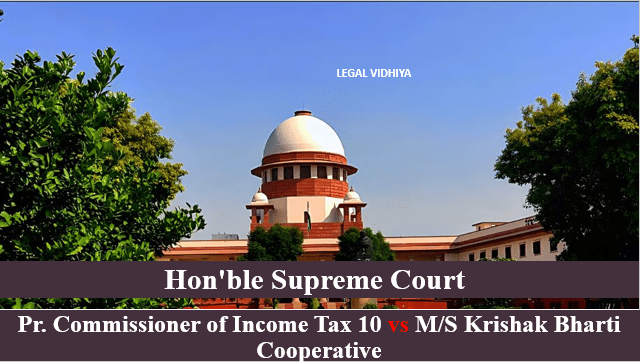
| CITATION | CIVIL APPEAL NO. 836 OF 2018 |
| DATE OF JUDGMENT | 15th September,2023 |
| COURT | Supreme Court of India |
| APPELLANT | Principal Commissioner of Income Tax-10 |
| RESPONDENT | M/s Krishak Bharti Cooperative Ltd |
| BENCH | M.M. Sundresh , Prashant Kumar Mishra |
Introduction:
“Pr. Commissioner of Income Tax 10 vs M/S Krishak Bharti Cooperative, 2023” is a notable legal case that took place in the Indian judicial system. The case involves Principal Commissioner of Income Tax-10 as the appellant, and M/s Krishak Bharti Cooperative Ltd as the respondent. The case is related to legal disputes or matters involving the M/s Krishak Bharti Cooperative Ltd and Principal Commissioner of Income Tax-10. The year 2023 signifies the year in which the case was heard or decided by the relevant court.
This case analysis involves a dispute between the Principal Commissioner of Income Tax-10 (the appellant) and M/s Krishak Bharti Cooperative Ltd. (the respondent) regarding the taxation of dividend income earned by the respondent. The case revolves around the interpretation of the Double Taxation Avoidance Agreement (DTAA) between India and Oman and the relevant provisions of Indian and Omani tax laws.
Facts of the Case:
The respondent, M/s Krishak Bharti Cooperative Ltd., is a multi-state cooperative society registered in India under the Department of Fertilizers, Ministry of Agriculture and Cooperation, Government of India.
The respondent entered into a joint venture with Oman Oil Company to create Oman Fertilizer Company SAOC (OMIFCO) in Oman, a company registered under Omani laws, with the respondent having a 25% share in the joint venture.
OMIFCO manufactures fertilizers, which are purchased by the Indian government. The respondent has a branch office in Oman, independently registered under Omani laws, with permanent establishment status in Oman.
Under Indian tax laws, the assessment for the relevant year was completed, and tax credit was allowed in respect of the dividend income received by the respondent from OMIFCO. However, the Omani tax laws exempted the dividend income from taxation.
The Principal Commissioner of Income Tax (PCIT) issued a show cause notice under Section 263 of the Income Tax Act, stating that the reliance on Article 25(4) of the DTAA was erroneous and that no tax credit was due to the respondent under Section 90 of the Act.
The PCIT rejected the contentions raised by the respondent, stating that Article 25 of Omani tax laws was not applicable and that the respondent was not covered under the exemption.
The respondent appealed to the Income Tax Appellate Tribunal (ITAT), which allowed the appeal, stating that the PCIT’s order under Section 263 was without jurisdiction.
The decision of the ITAT was challenged before the Delhi High Court, which ruled in favor of the respondent, stating that, according to the terms of the DTAA between India and Oman, the respondent was entitled to claim the tax credit.
Issues Raised:
1. The primary issue in this case is whether the dividend income earned by the respondent is taxable in India, given that it is exempted under Omani tax laws, and
2. Whether the respondent is entitled to the benefits of the Double Taxation Avoidance Agreement between India and Oman.
Appellant ‘s Contention
11. The appellant argued that the dividend received by the respondent should be taxable in India since it was not eligible for tax exemption under Omani tax laws, which were meant to promote economic development in Oman.
2. The appellant also questioned the validity of a letter issued by the Omani Ministry of Finance.
Respondent’s Contention
1. The respondent contended that the DTAA and Omani tax laws exempted the dividend income, and the letter from the Omani Ministry of Finance clarified the provisions.
2. The respondent argued that since it had set up a permanent establishment in Oman, it was entitled to the same tax treatment in India as it received in Oman.
Judgement:
1. The Supreme Court of India upheld the decisions of the ITAT and the Delhi High Court, ruling in favor of the respondent.
2. The Court concluded that the dividend income received by the respondent was exempt from taxation both under the Omani tax laws and the DTAA between India and Oman.
3. The Court recognized that the tax exemption under Omani laws was aimed at promoting economic development in Oman by attracting investments, and the respondent was entitled to the tax credit under Article 25(4) of the DTAA.
Conclusion:
In this case, the Supreme Court determined that the dividend income earned by the respondent was exempt from taxation under both Omani tax laws and the Double Taxation Avoidance Agreement between India and Oman. The Court’s decision affirms the principle of avoiding double taxation and ensuring that taxpayers are not unfairly burdened with taxes on the same income in multiple jurisdictions when tax exemptions are provided for a legitimate purpose, such as promoting economic development.
REFERENCE
This Article is written by Jaishree Sharma student at Rajasthan University, Jaipur; and an Intern at Legal Vidhiya.




0 Comments